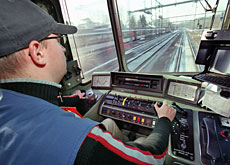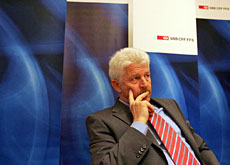Railways drives finances back into the black

The Swiss Federal Railways has posted a net profit of SFr259.4 million ($212.6 million) for 2006, a turnaround from last year's SFr166 million loss.
The improvement came after most operational sectors recorded better results and the liquidation of reserves worth SFr131 million. But despite the good news, not everyone is smiling on the railways.
In mid-December, industrial action by railway workers was diverted at the 11th hour when management and public sector unions reached agreement over restructuring plans. Had a strike gone ahead it would have been the first time employees had downed tools since 1918.
But the outcome failed to satisfy everyone. To find out what employees think of the situation, swissinfo took a ride onboard the Bern-Chiasso intercity train.
“Listen, I prefer not to talk to you,” said the smiling ticket inspector as we left Bern. “The train is full of bosses; we’ll speak later.”
The beautiful Emmental countryside flies by, but inside the train the mood is more sombre.
“Many colleagues are unhappy; the job’s becoming more and more stressful,” the inspector suddenly explains as we arrive in Lucerne. “I have been working on the railways for five years now and for me things are not too bad though, even if the overall situation has got worse.”
At Lucerne a railway worker taking his lunchtime break shares his dissatisfaction.
“I’ve been working for this company for almost 20 years and things have never been as bad as today,” he said.
“In our team we have a serious management problem. The amount of work keeps increasing and we often work more than eight hours without a break. The only positive thing is the salary, which is not bad.”
Deserted stations
Our journey continues southwards. Welcoming us into his cabin, the driver proudly tells us, unlike his colleagues, how much he still loves his job.
“Look at that,” says the 50-year-old driver, pointing at the snowy-topped mountains, villages and lakes. “This has been my office for the last 28 years. Today I’m off to Locarno, as if I’m going on holiday.”
We speed past several teams of workers who wave hello.
“It’s really nice to have some human contact, but it’s sad to see all these deserted stations. On the Gotthard route you don’t see anyone working there as most stations have been automated.”
As the train heads further south towards Chiasso, we pass the building site of the new Gotthard rail tunnel, which will become the world’s longest tunnel when it is completed in ten years time.
A different inspector from the Italian-speaking region joins us for a chat.
“Over these last 15 years things have changed very quickly. It hasn’t been easy for everyone to adapt,” he says.
“For example, 20 years ago there used to be 160 of us at the main rail hub in Bellinzona. Today there are only 45 and it’s not as if there is less work.”
“Competition, productivity and flexibility. That’s what it’s all about now, and not just on the railways; we have to appreciate the good things we’ve still got left.”
swisinfo, Marzio Pescia
The state-owned Swiss Federal Railways net group profit of SFr259.4 million last year is the company’s second highest profit since 2001.
Earnings before interest and tax jumped from a SFr79.2-million loss to a SFr343.8-million profit.
Profit from rail passenger traffic rose by 78.6% to SFr193.7 million.
Goods transport remained in the red, however, with losses reduced from SFr165.7 million to SFr37.3 million.
Problems also remain with the company pension scheme which is still in the red.
The group employed 27,933 staff in 2006.
The Swiss railway network spans more than 3,000 kilometres and has one of the highest densities in the world.
The system transported nearly 285 million passengers and more than 56 million tons of freight in 2006.
There are some 30 standard gauge railway companies, including Swiss Federal Railways, currently operating routes on Swiss territory.

In compliance with the JTI standards
More: SWI swissinfo.ch certified by the Journalism Trust Initiative











You can find an overview of ongoing debates with our journalists here . Please join us!
If you want to start a conversation about a topic raised in this article or want to report factual errors, email us at english@swissinfo.ch.